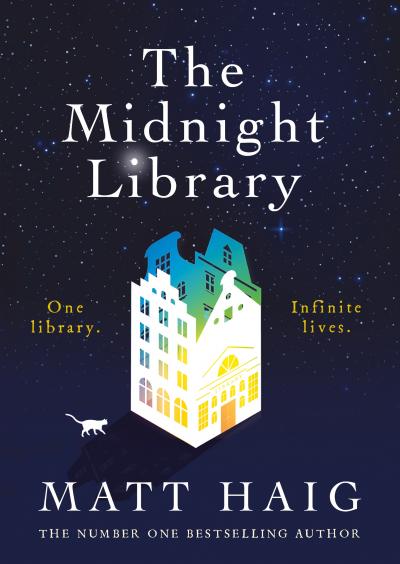TW: This article discusses suicide, suicidal ideation, antidepressants and self-harm
We first meet Nora Seed, “nineteen years before she decides to die”, as she plays chess in the school library with Mrs Elm, the matter-of-fact school librarian. Nora, who is treated ‘like a mistake in need of correction by her mother”, seeks comfort and kindness from Ms Elm, after finding out her father has died. Nineteen years later, after a series of painful events, including the loss of her job and the death of her cat, Nora feels that the world would simply be better off without her. She ruminates on the failures she has made, believing, “Every move had been a mistake, every decision a disaster, every day a retreat from who she’d imagined she’d be.”
She decides to overdose on pills, but does not meet the oblivion she was hoping for. Instead she finds herself wandering an enormous library, where the books without titles enable her to rewrite her own life story by undoing the decisions that have haunted her as regrets. The author of Reasons to Stay Alive, Notes on a Nervous Planet, and How to Stop Time, in his latest novel The Midnight Library, Matt Haig charts her story, from the hours before she attempts to kill herself, to the days she spends hopping between infinite possible lives on a time-travelling adventure. The novel’s simple yet fantastical premise renders Nora’s story a modern day parable, exploring regret, pain and the richness of the ordinary in life. An exquisite depiction of existential depression and the lessons it can reveal, The Midnight Library is a captivating story and an uplifting antidote to the cult of self-improvement: a manifesto for true self-acceptance.

As a reviewer, my own lived experience with existential depression and suicidal ideation meant that I faced this book with a tightness in my chest. I was both intrigued and uneasy about the use of a fantastical library to explore something as real and horrific as suicidal depression. However, on meeting Nora – a complex but deeply likeable character – I had faith that the book would be a compassionate illustration of an often stigmatised experience.
The warped logic of severe depression is honestly and clearly expressed, as Haig describes the “inescapable feeling brewing in the darkness” when Nora sees Voltaire, her dead cat, lying on the road. The feeling she experiences is “envy”: she is jealous of the cat's “complete absence of pain.” Nora's inner landscape is artfully rendered on the page: “She was afraid of motherhood.The fear of deeper depression.” I felt my gut wrench as I read this sentence – never before has a writer so perfectly captured my experience of the power of mental illness to haunt and destabilise, to instill a fear of further suffering.
As a consequence of her self-critical thoughts, Nora overdoses and is surprised to find herself in the library, where the time on her watch is stuck at midnight. Confused and self-questioning, Nora is eventually greeted by Mrs Elm, the school librarian, who guides Nora through the tomes, and encourages her to open a heavy book called The Book of Regrets. Nora's regrets range from not marrying her ex-boyfriend Dan to failing to become an Olympic swimmer.
As Mrs Elm guides her through the library, plucking the books from the shelves, Nora is able to undo her regrets, by re-entering her life having made different decisions. As she explores her infinite possible lives, she encounters experiences from the ordinary to the remarkable, including narrowly avoiding being eaten by a polar bear in Norway having changed her university course from Philosophy to Geology and taking a role at the Polar Research Institute. Most heartbreakingly, after choosing to go for a coffee with her kind neighbour instead of turning down his offer, Nora meets the seven-year-old daughter they could have had together. Eventually facing disappointment with every regret she expunges, Nora returns to the library confused. In response, the wise Mrs Elm relentlessly reminds Nora of "the big importance” of the “small things”, as Nora discovers that her actions in the “root life” that she tried to end, such as picking up prescriptions for an elderly neighbour, Mr Banerjee, really mattered.
Self-harm is discussed throughout the novel, with calmness and grace, as Haig describes the tell-tale “scar lines” that Nora notices on her body in some of the different lives that she enters. However, I found the depiction of antidepressants reductive: when Nora enters one of her favourite potential lives, she views the absence of antidepressants in the bathroom drawer as evidence of a happy life. Writing from lived experience, Haig is right to critically examine the efficacy of powerful medication; however, in a book that treats every other aspect of mental health with such compassion, it is disappointing to find an implicit disregard for what is, for many who battle with suicidal urges, a life-saving and life-maintaining treatment.
On a beautiful page titled “Expectation”, Nora imagines “What it would be like to accept herself completely, every mistake she had made... every dream she hadn't reached. She imagined accepting it all, the way she accepted nature, the way she accepted a glacier or a puffin or the breach of a whale.” Acceptance, posits Haig, is freedom, and this masterful novel is a more powerful guide to self-acceptance than any self-help book. Despite the fantastical nature of the plot, Nora is the anchor of the story: whether at home on the verge of taking an overdose, or browsing through magical books in the midnight library, she is absolutely real. As readers, her journey is our journey, and by the end, my own “book of regrets” felt considerably lighter.
- The Midnight Library by Matt Haig (Canongate, £16.99)
- Read more book reviews on theartsdesk















Add comment